Dear Artist,
Growing up, my Dad used to casually throw out an idiom that went, “There’s no such thing as undiscovered genius.” Over time, as my brothers and I embarked on slow-burning careers in the arts, we internalized his words as a call to work as hard as possible. We fleshed out this ethic with another favourite family strap-line: “Keep busy while waiting for something to happen.”
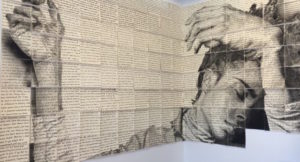
Study for Entanglements, 2019
Kozo paper, ink, china marker, aerosol paint
200 × 100 inches
by Kenturah Davis (b. 1984)
When I was about 30, I sought the advice of a professional who advertised in the yellow pages as a “change specialist.” When I told him about the global dearth of undiscovered geniuses, his eyes drooped with pity. “You are incapable of managing your life,” he said, and asked for my credit card. He suggested a cure of twice-weekly sessions for six months. On the drive home, I decided that coughing up $400 a week for therapy would make my life even more unmanageable.
First identified in 1978 by psychologists Pauline Rose Clance and Suzanne Imes, imposter syndrome is defined as a feeling of inadequacy that persists despite evident success — believing that luck is the reason for any gains. Originally thought to have originated with family dynamics, it’s now believed that imposter syndrome could be caused by everything from neuroticism and behavioral habits to systemic discrimination, stereotypes about competence and intelligence, internalized sexism and the patriarchy. Once thought to exist only in women, further research has found that imposter syndrome is merely a form of perfectionism.
In art, the most prevalent cases of personal doubt appear among the successful. If you have imposter syndrome, you may actually be good. “I have written 11 books,” wrote Maya Angelou, “but each time I think ‘Uh-oh, they’re going to find out now. I’ve run a game on everybody, and they’re going to find me out.’ Perhaps it has something to do with loving work that is difficult to do well. And doing work that you’re compelled to do, regardless of reward. My Dad often mused that he felt like he was getting away with something, but all the while, I noticed he was devoting himself to the work at hand.
If you’re wondering about your own feelings of fraudulence, you can take Dr. Clance’s Imposter Phenomenon Scale Test, here. And while self-doubt in the arts can manifest as jealousy, depression or hopelessness, consider it, instead, as a call to work. Commit to a path of lifelong learning. Channel your attention towards developing ideas and keeping a vigil for your own quality. Consider also that perhaps imposter syndrome in artists is merely a safety catch for the ego force required to strive in the direction of genius in the first place.
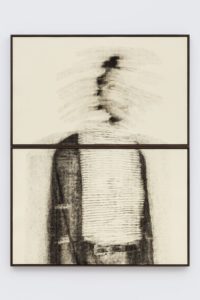
Blur in the Interest of Precision, 2018
Oil paint applied with rubber stamp letters and graphite grid on embossed Mohachi paper
54 x 42 inches
by Kenturah Davis
Sincerely,
Sara
PS: “I am not a writer. I’ve been fooling myself and other people.” (John Steinbeck)
Esoterica: One of the most common techniques for managing imposter syndrome is an exercise called, “reframing,” which is simply coming up with new ways to respond to challenges. Over time and with practice, reframing allows us to disrupt unhelpful thought patterns. Think, for example, of your feelings of doubt not as a hindrance, but as a skill for reflection and improvement. Insecurity is a kind of hunger. Don’t let it eat you alive, but rather cultivate work habits and a conviction to being good. As artists, we’re designed for insight and to strive for deeper and more beautifully executed ideas. “Competence,” said Canadian astronaut Chris Hadfield, “means keeping your head in a crisis, sticking with a task even when it seems hopeless, and improvising good solutions to tough problems when every second counts. It encompasses ingenuity, determination and being prepared for anything.”
Have you considered a Premium Artist Listing? With each letter, an artist is featured at the bottom of this page. The Premium Artist Listings are a means of connecting artist subscribers through their work. Proceeds from each listing contribute to the production of The Painter’s Keys.
“Ignorance more frequently begets confidence than does knowledge.” (Charles Darwin)
Featured Workshop
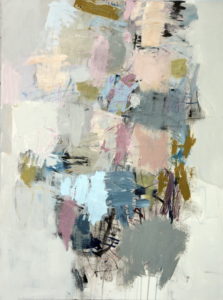 Have some experience painting, but want to explore the elements of non-objective painting in more depth, increase your confidence and creative intelligence? Boldly Abstract 2 is for you. As in Boldly Abstract 1 we will cover aspects of color, composition and mark making however through a series of more challenging exercises meant for those with more painting experience. Learn how to fix an unsatisfying painting. We will share our extensive knowledge of the art business with you, covering such topics as the mechanics of running your own art business, applying to galleries and the ins and outs participation in art fairs.
Have some experience painting, but want to explore the elements of non-objective painting in more depth, increase your confidence and creative intelligence? Boldly Abstract 2 is for you. As in Boldly Abstract 1 we will cover aspects of color, composition and mark making however through a series of more challenging exercises meant for those with more painting experience. Learn how to fix an unsatisfying painting. We will share our extensive knowledge of the art business with you, covering such topics as the mechanics of running your own art business, applying to galleries and the ins and outs participation in art fairs.
August 19, 20 and 21
9 am to 4:30 pm
$950 Bring a friend and save $50 each. Take both workshops and save $100
https://artbycat.com/page/1-Workshops-Prints.html
Featured Artist
We live in a fractured world. Wars, famine and power games are forcing people to abandon their homes and their way of life in hopes of finding peace. For lack of education or specialized skills, the poor are not accepted into our northern communities. They stay in the camps on the borders of turmoil, separated from local community. Animals are caught in the crossfire. Even the trees and the rocks suffer the agony of imbalance. This chaos is evident in my work. In between the rivulets of paint and the textural accidents I choose colours and forms to suggest a landscape where beauty continues to reign. We can still change the tide and build a new world harmony. Certainly, contemporary will focuses on gold instead of beauty. Yet, beauty is essential to the wellbeing of the planet. She is essential to the survival of humanity.

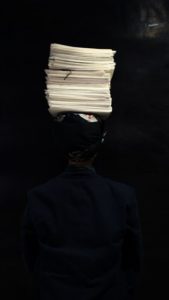
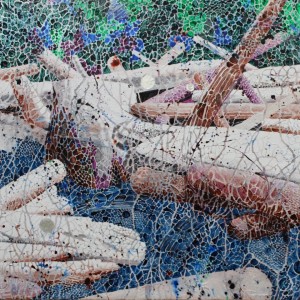


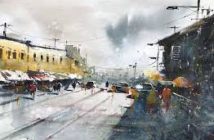
24 Comments
Well I scored very high in the Impostor Phenomenon Scale Test. Something I am good at! But the results were probably rigged…
81-100. Intense Impostorism. Makes me sad.
I’ve worked extremely hard over many years to build an extensive and impressive resume. (Resumes hardly count anymore). When I take a peek at it I think I’ve lied, I haven’t, I’ve worked!
Darling, you are good enough!
I like the suggestions “reframing”what we feel are inadequacies as motivators in moving forward – perhaps we will discover a genius in our work even if we feel it comes from some other entity. Perhaps seeing the brush as a good friend we want to spend time with may help. It’s not all about me :)
Thank you Sara! Very helpful insight!
Scored high on the test. I might add that I tend to defer to a negative critique of work I do rather than a positive one. I am getting better at self assessment. However, I want everything I do to be as good or better than the last one. I am learning to cut myself some slack, to regard every piece as a step forward. There is a lot of ego to overcome.
66. Doesn’t surprise me. It’s a thought-provoking way of looking at one’s self. Thanks for sharing, Sara.
Thank you for this today, Sara. Just what I needed to read and save to read again. And also thank you for Kenturah Davis’ work–I’m headed to look at some more. Have a lovely weekend
I have a bad habit of over-working a painting… I need to turn it to the wall and walk away… start something else but I do look for ways to improve my work and make a mess… am I alone there? Any suggestions as to what to do….>
I am so guilty! A big prize in a museum…only happened because of my color matched the colors of all the other winners paintings… for the newspaper’s planned page.??? Really! That happened.
This from another high scorer (I always do well on tests, but think it’s just because they’re biased to favor my particular skills): I really appreciate the advice to keep on keepin’ on. Just get out to the studio and get to work. Excellent advice.
I’m a very small female, a bit quiet at first, and now I’m over 60. I’ve always felt that people underestimate me right up till they inevitably over estimate me. Yes. I scored high!
71 score- significant imposter syndrome. I’m learning to reframe my negative thoughts and statements. I wonder why artists are prone to imposterism. Is it that that goads us on to create something else at best and at worst paralyzes us ?
It seems to me to focus on the love and beauty in our personal self expression and can serve as a gift to another.
I’ve heard of this before. It explains why some really bright people tend to be more “low key”.
But then, better to be that way than the opposite. Otherwise you would probably end up a second tier IT manager or president of the United States. Take your pick.
Interesting little “test”…. from the tenor of the questions it should be called the wimp test.
If you think your work is bad, it probably is….but that surely doesn’t mean you won’t be successful or considered genius material….especially in the arts!
Artists vs. Astronauts….really?
Very low score here by the way….
I respectfully disagree. I am happy for you that you do not suffer from impostor syndrome, however, it is a real thing even for quite accomplished professionals, and certainly not just the arts. I believe that it’s partly innate insecurity, but also consider the Dunning-Kruger effect, whereby it is shown that those who know very little often rate themselves as having a very high level of understanding in a certain area, then as people know more they begin to realise how little they really know of the topic as they begin their hard work towards virtuosity.
I experienced this myself. I thought my (terrible) art was quite good, until I began to learn a lot more, and ever since then I have struggled with the feeling that I know very little, as the actually quality of my work improved exponentially. Even though my realist wildlife art sells well and for many $$$$, I still think I’m winging it, and only barely (if at all) competent. It took me 43 years to get to this point. Perhaps if I paint for another 40 years I may one day feel like I know enough and am good enough to be doing what I am already doing, and will see more than badly applied paint when I look at one of my paintings.
Buyers rate my work highly, I however think I am an imposter, and a bit of a hack. It is excruciating, and unfortunately plays right into the tortured artist stereotype.
Thanks for your post and the little test. – Tom Relth Vancouver WA http://www.relth.org
Considering several aspects of the present, I think the Darwin quote is dead center correct. Again (too good to not repeat) “Ignorance more frequently begets confidence than does knowledge.”
Considering several aspects of the present, I think the Darwin quote is dead center correct. Again (too good to not repeat) “Ignorance more frequently begets confidence than does knowledge.”
https://painterskeys.com/dunning-kruger/
Related…
Sara, I’m pretty sure that this subject of Imposter Syndrome encompasses a lot more that art. My career for much of my adult work life was as an Emergency RN in a large teaching hospital. Despite specialized critical care training, I was always afraid that ‘they’ would ‘find out’ how much I didn’t know. And yet, I was one of the more experienced, skilled, and educated nurses from a clinical bedside perspective Funny how that goes, eh?
My score today was 61. If I had taken ‘the test’ when I was younger, it would have been a lot higher. With aging comes a degree of wisdom and relaxation. For a view of how immaterial all of our worry really is, have a look at this: https://www.nao.ac.jp/study/uchuzu2013/scroll/en.html
We need to take life less seriously. Go in peace.
Cheers,
Verna
Verna, there certainly is more to our lives than meets the eye. To me, that’s the beauty, mystery and challenge of living.
For years I belittled my artistic talents because I was self taught even though I earned a living as a commercial artist for years. Even though I designed, manufactured and marketed a gift item, I thought I was not an artist. Even though at 60 years old I studied to become a textile designer, won a grant and recognition for my designs but was unable to grasp computer skills and therefore unable to find work I thought I was a failure. Now at 73 years old I paint everyday and realize that all along I based my “artistic talent” on what I was able to earn financially and that the heart and soul awakening I had at 16 years old that I was a painter was truth and that all the rest was just societal programing.
One of your very best letters, full of insight and has touched on a wollybugger that follows most of us around.
Thank you,
Susan Truex